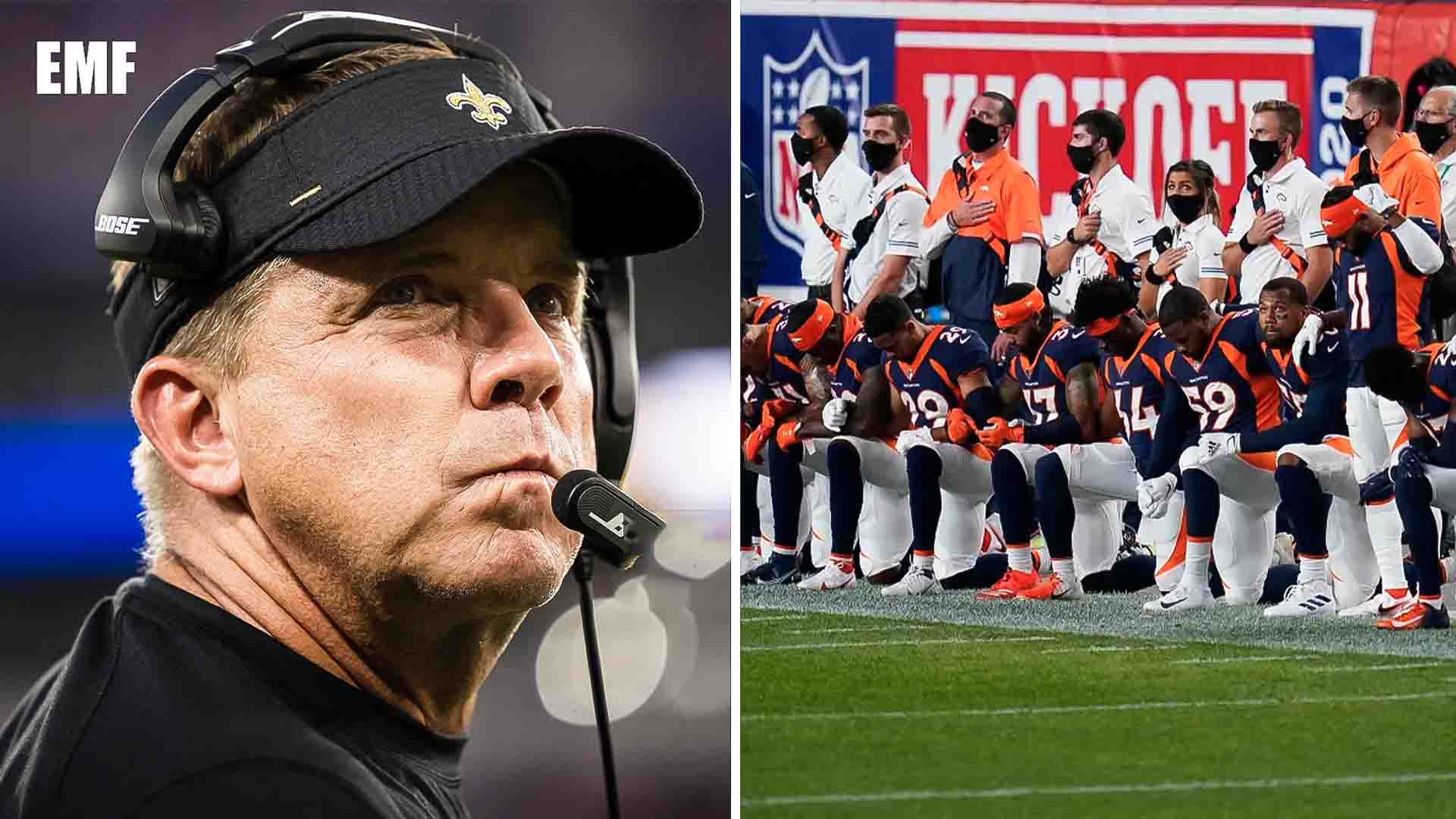In the unpredictable realm of professional football, where each week brings its own share of drama, Coach Sean Payton of the New Orleans Saints has delivered a masterstroke in both strategy and satire. Known for his innovative play-calling and candid personality, Payton has taken a bold step that merges tactical genius with a sharp social commentary.
His recent decision to bench three of his star players, ostensibly to address a controversial issue, has sent ripples through the NFL and beyond. In a move that could only be described as both audacious and satirical, Payton has sparked a whirlwind of debate about the intersection of sports, politics, and performance.
The stage was set during a high-stakes game where the Saints were locked in a tight battle with their rivals. As the game reached its zenith, Payton made an unexpected and dramatic decision: he pulled three key players off the field and announced to the bewildered crowd, “No need to kneel anymore.” This move was not just a tactical adjustment but a pointed commentary on the ongoing national conversation about athlete protests and social justice.
To fully grasp the weight of Payton’s decision, one must delve into the context. Over the past few years, the NFL has been embroiled in a heated debate over player protests during the national anthem. What began as a solitary act of dissent by former quarterback Colin Kaepernick evolved into a broader movement, with athletes using their platform to address issues of racial inequality and police brutality. While some lauded the protests as a courageous stand, others viewed them as an affront to national symbols and values.
Payton’s decision to bench players who had been prominent in these protests was a calculated gesture that transcended mere game strategy. By removing them from the field and making a public statement about their actions, Payton injected a layer of satire into the situation. It was a move that seemed to blend football acumen with a pointed critique of the ongoing dialogue surrounding player protests.
The satirical nature of Payton’s action lay in its ability to highlight the absurdity of politicizing sports. In a sport that thrives on physicality and competitive spirit, the notion of benching players as a commentary on their political expressions was both an ironic and a potent statement. Payton seemed to be saying, “If we’re going to turn sports into a political battleground, let’s take it to its logical extreme.” His decision was a reflection on how sports, often a refuge from societal conflicts, have become entangled in the very issues they once transcended.
In a press conference following the game, Payton’s explanation further underscored the satirical edge of his move. He spoke about the importance of focusing on the game and suggested that the field was no place for political demonstrations. “Football is about unity and teamwork,” Payton argued. “It’s a place where we come together, regardless of our personal beliefs, to achieve a common goal. If we let politics divide us on the field, we’re undermining what makes the sport great.”
However, Payton’s satire was not without its critics. The decision to bench the players drew mixed reactions from fans, pundits, and players themselves. Some applauded the move as a refreshing take on a polarizing issue, while others condemned it as a cynical exploitation of a serious social issue. The backlash highlighted the fine line Payton walked between clever commentary and potentially inflammatory rhetoric.
The players who were benched, in particular, became the focal point of the debate. Their responses ranged from bemusement to frustration. One player, who had been vocal about social justice issues, expressed disappointment, stating that the decision felt like a dismissal of their efforts to use their platform for positive change. Another player, more pragmatic in his response, suggested that Payton’s move was a strategic gambit aimed at redirecting attention from the team’s performance on the field.
Amidst the controversy, Payton’s action also sparked a broader reflection on the role of athletes in societal issues. His satirical stance served as a catalyst for discussions about the extent to which sports figures should be involved in political activism and how their actions are perceived by the public. It prompted fans and analysts alike to question whether the focus on political statements in sports was overshadowing the essence of the game itself.
In a larger context, Payton’s decision can be seen as part of a tradition of using satire and symbolic acts to comment on social and political issues. Just as comedians and artists use their platforms to challenge norms and provoke thought, Payton’s approach used the arena of professional football to engage with contemporary debates. By leveraging the high-stakes environment of a football game to make a statement, Payton highlighted the ways in which sports can reflect and influence broader societal conversations.
Ultimately, Coach Sean Payton’s decision to bench his players and the subsequent commentary served as a reminder of the power of sports to both mirror and challenge societal values. His satirical approach not only drew attention to the complexities of player protests but also underscored the enduring tension between sports as a unifying force and sports as a stage for political expression. In a world where every move on the field is scrutinized and analyzed, Payton’s bold maneuver was a testament to the ways in which sports can transcend the game itself, sparking conversations that extend far beyond the boundaries of the field.
